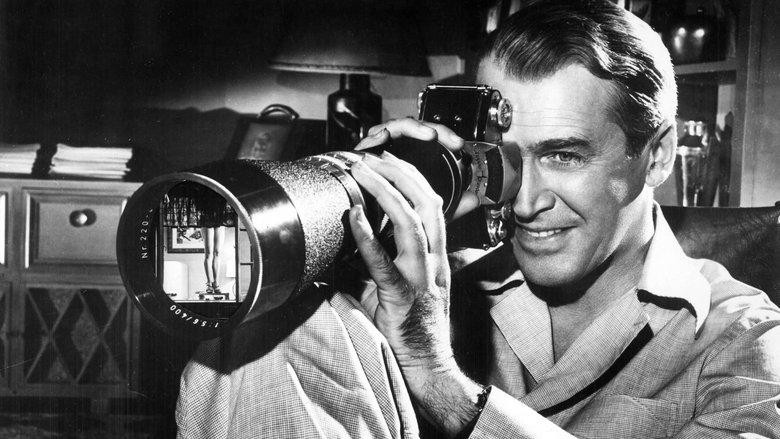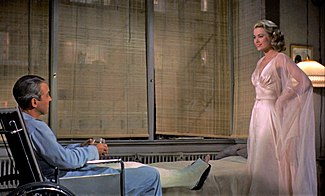← Back to Reviews

in
REAR WINDOW
Alfred Hitchcock, the undisputed king of cinematic suspense, earned one of his five Best Director nominations for 1954's Rear Window, an atmospheric and stylized nail biter that unfolds slowly without a lot of red herrings but delivers a climax that definitely had me on the edge of my chair and that's only because the master was behind the camera. Say what you will, but Hitchcock was the only director where no matter what film of his you're experiencing, the standout element of the film was his direction.

This superb piece of entertainment stars James Stewart as L.B. "Jeff" Jefferies, an acclaimed magazine photographer who has been wheelchair bound in his apartment for six weeks due to a broken leg and is going stir crazy. Jeff's boredom has him spending hours looking out the window and observing his various neighbors and creating his own stories about the lives of the varied neighbors, including a lonely spinster who actually pretends to have gentleman callers, a songwriter whose career seems to be having many ups and downs, and a pretty dancer who likes to stretch in front of her open window. But those neighbors' stories take a back seat for Jeff when it starts to look like another neighbor (Raymond Burr) may have murdered his wife.

Jeff shares his theory with his wealthy, self-absorbed girlfriend Lisa (Grace Kelly) and his nurse/housekeeper, Stella (Thelma Ritter), who are both initially skeptical about what Jeff thinks he has seen but are eventually on board with Jeff and want to help him nab this guy. Unfortunately, Jeff's buddy Doyle (Wendell Corey), a police detective, is a little more difficult to convince and his initial look into Jeff's suspicions are unable to be substantiated and have Jeff and the viewer scratching our collective heads as to the validity of Jeff's theory.

Hitchcock really knocked it out of the park here, creating a deliciously entertaining suspense film that unfolds so deliberately that we're not really sure what's going on here, even though it's obvious that it's going to involve one of his neighbors. I love the way John Michael Hayes' screenplay firmly establishes the kind of level-headed, but adventurous guy that Jeff is, while subtly foreshadowing what is going to happen through Kelly and Ritter's characters...five minutes after her initial entrance into the story, Ritter's Stella makes it clear that Jeff needs to stop looking out the window because he's going to see something he's not expecting. Jeff's relationship with Lisa has a couple of different layers...we see that Jeff is feeling a little smothered by Lisa and he actually attempts to use this mystery to discreetly end his relationship with Lisa, but it only has the exact opposite effect.

Hitchcock must also be applauded for the attention he put into establishing the individual lives of Jeff's neighbors...I was amused by one window revealing a couple who has just been married and after the traditional carrying over the thresh hold, they are the only neighbors observed actually closing their windows and blinds. I also love the way Hitchcock legitimizes all these neighbors having their windows and shades open by giving us an almost immediate close up of a thermometer revealing a temperature in the 90's making us accept the fact every neighbor has their windows open and one couple is even sleeping on their balcony because it's too hot in the apartment.

Hitchcock and Stewart reunite after The Man Who Knew Too Much and prove to be a formidable team and Kelly, draped in gorgeous Edith Head costumes, is smoldering and sexy. Ritter, as always, provides just enough comic relief to serve the story and I've never enjoyed Wendell Corey onscreen more as Doyle. Psycho is definitely Hitch's masterpiece, but this one sure gives Psycho a run for its money. BTW, the voice of Jeff's editor on the phone in the opening scene is future Oscar winner Gig Young.
Re-thought for television in 1998 for Christopher Reeve, who was already paralyzed.
Alfred Hitchcock, the undisputed king of cinematic suspense, earned one of his five Best Director nominations for 1954's Rear Window, an atmospheric and stylized nail biter that unfolds slowly without a lot of red herrings but delivers a climax that definitely had me on the edge of my chair and that's only because the master was behind the camera. Say what you will, but Hitchcock was the only director where no matter what film of his you're experiencing, the standout element of the film was his direction.

This superb piece of entertainment stars James Stewart as L.B. "Jeff" Jefferies, an acclaimed magazine photographer who has been wheelchair bound in his apartment for six weeks due to a broken leg and is going stir crazy. Jeff's boredom has him spending hours looking out the window and observing his various neighbors and creating his own stories about the lives of the varied neighbors, including a lonely spinster who actually pretends to have gentleman callers, a songwriter whose career seems to be having many ups and downs, and a pretty dancer who likes to stretch in front of her open window. But those neighbors' stories take a back seat for Jeff when it starts to look like another neighbor (Raymond Burr) may have murdered his wife.

Jeff shares his theory with his wealthy, self-absorbed girlfriend Lisa (Grace Kelly) and his nurse/housekeeper, Stella (Thelma Ritter), who are both initially skeptical about what Jeff thinks he has seen but are eventually on board with Jeff and want to help him nab this guy. Unfortunately, Jeff's buddy Doyle (Wendell Corey), a police detective, is a little more difficult to convince and his initial look into Jeff's suspicions are unable to be substantiated and have Jeff and the viewer scratching our collective heads as to the validity of Jeff's theory.

Hitchcock really knocked it out of the park here, creating a deliciously entertaining suspense film that unfolds so deliberately that we're not really sure what's going on here, even though it's obvious that it's going to involve one of his neighbors. I love the way John Michael Hayes' screenplay firmly establishes the kind of level-headed, but adventurous guy that Jeff is, while subtly foreshadowing what is going to happen through Kelly and Ritter's characters...five minutes after her initial entrance into the story, Ritter's Stella makes it clear that Jeff needs to stop looking out the window because he's going to see something he's not expecting. Jeff's relationship with Lisa has a couple of different layers...we see that Jeff is feeling a little smothered by Lisa and he actually attempts to use this mystery to discreetly end his relationship with Lisa, but it only has the exact opposite effect.

Hitchcock must also be applauded for the attention he put into establishing the individual lives of Jeff's neighbors...I was amused by one window revealing a couple who has just been married and after the traditional carrying over the thresh hold, they are the only neighbors observed actually closing their windows and blinds. I also love the way Hitchcock legitimizes all these neighbors having their windows and shades open by giving us an almost immediate close up of a thermometer revealing a temperature in the 90's making us accept the fact every neighbor has their windows open and one couple is even sleeping on their balcony because it's too hot in the apartment.

Hitchcock and Stewart reunite after The Man Who Knew Too Much and prove to be a formidable team and Kelly, draped in gorgeous Edith Head costumes, is smoldering and sexy. Ritter, as always, provides just enough comic relief to serve the story and I've never enjoyed Wendell Corey onscreen more as Doyle. Psycho is definitely Hitch's masterpiece, but this one sure gives Psycho a run for its money. BTW, the voice of Jeff's editor on the phone in the opening scene is future Oscar winner Gig Young.
Re-thought for television in 1998 for Christopher Reeve, who was already paralyzed.
